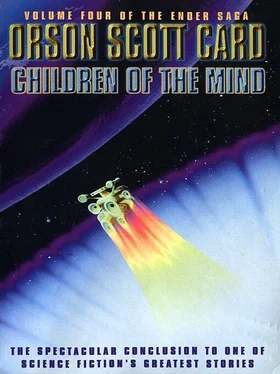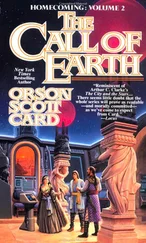Orson Card - Children of the Mind
Здесь есть возможность читать онлайн «Orson Card - Children of the Mind» весь текст электронной книги совершенно бесплатно (целиком полную версию без сокращений). В некоторых случаях можно слушать аудио, скачать через торрент в формате fb2 и присутствует краткое содержание. Жанр: Фантастика и фэнтези, на английском языке. Описание произведения, (предисловие) а так же отзывы посетителей доступны на портале библиотеки ЛибКат.
- Название:Children of the Mind
- Автор:
- Жанр:
- Год:неизвестен
- ISBN:нет данных
- Рейтинг книги:3 / 5. Голосов: 1
-
Избранное:Добавить в избранное
- Отзывы:
-
Ваша оценка:
- 60
- 1
- 2
- 3
- 4
- 5
Children of the Mind: краткое содержание, описание и аннотация
Предлагаем к чтению аннотацию, описание, краткое содержание или предисловие (зависит от того, что написал сам автор книги «Children of the Mind»). Если вы не нашли необходимую информацию о книге — напишите в комментариях, мы постараемся отыскать её.
Children of the Mind — читать онлайн бесплатно полную книгу (весь текст) целиком
Ниже представлен текст книги, разбитый по страницам. Система сохранения места последней прочитанной страницы, позволяет с удобством читать онлайн бесплатно книгу «Children of the Mind», без необходимости каждый раз заново искать на чём Вы остановились. Поставьте закладку, и сможете в любой момент перейти на страницу, на которой закончили чтение.
Интервал:
Закладка:
So it was that when Peter and Wang-mu hiked through the woods of the great natural preserve where their starship had landed and emerged in a village of foresters, laughing about how long they had been "lost" in the woods, no one thought twice about Wang-mu's obviously Chinese features and accent, or even about Peter's white skin and lack of an epicanthic fold. They had lost their documents, they claimed, but a computer search showed them to be licensed automobile drivers in the city of Nagoya, and while Peter seemed to have had a couple of youthful traffic offenses there, otherwise they were not known to have committed any illegal acts. Peter's profession was given as "independent teacher of physics" and Wang-mu's as "itinerant philosopher," both quite respectable positions, given their youth and lack of family attachment. When they were asked casual questions ("I have a cousin who teaches progenerative grammars in the Komatsu University in Nagoya") Jane gave Peter appropriate comments to say:
"I never seem to get over to the Oe Building. The language people don't talk to physicists anyway. They think we speak only mathematics. Wang-mu tells me that the only language we physicists know is the grammar of dreams."
Wang-mu had no such friendly prompter in her ear, but then an itinerant philosopher was supposed to be gnomic in her speech and mantic in her thought. Thus she could answer Peter's comment by saying, "I say that is the only grammar you speak. There is no grammar that you understand."
This prompted Peter to tickle her, which made Wang-mu simultaneously laugh and wrench at his wrist until he stopped, thereby proving to the foresters that they were exactly what their documents said they were: brilliant young people who were nevertheless silly with love -- or with youth, as if it made a difference.
They were given a ride in a government floater back to civilized country, where -- thanks to Jane's manipulation of the computer networks -- they found an apartment that until yesterday had been empty and unfurnished, but which now was filled with an eclectic mix of furniture and art that reflected a charming mixture of poverty, quirkiness, and exquisite taste.
"Very nice," said Peter.
Wang-mu, familiar only with the taste of one world, and really only of one man in that one world, could hardly evaluate Jane's choices. There were places to sit -- both Western chairs, which folded people into alternating right angles and never seemed comfortable to Wang-mu, and Eastern mats, which encouraged people to twine themselves into circles of harmony with the earth. The bedroom, with its Western mattress raised high off the ground even though there were neither rats nor roaches, was obviously Peter's; Wang-mu knew that the same mat that invited her to sit in the main room of the apartment would also be her sleeping mat at night.
She deferentially offered Peter the first bath; he, however, seemed to feel no urgency to wash himself, even though he smelled of sweat from the hike and the hours cooped up in the floater. So Wang-mu ended up luxuriating in a tub, closing her eyes and meditating until she felt restored to herself. When she opened her eyes she no longer felt like a stranger. Rather she was herself, and the surrounding objects and spaces were free to attach themselves to her without damaging her sense of self. This was a power she had learned early in life, when she had no power even over her own body, and had to obey in all things. It was what preserved her. Her life had many unpleasant things attached to it, like remoras to a shark, but none of them changed who she was under the skin, in the cool darkness of her solitude with eyes closed and mind at peace.
When she emerged from the bathroom, she found Peter eating absently from a plate of grapes as he watched a holoplay in which masked Japanese actors bellowed at each other and took great, awkward, thundering steps, as if the actors were playing characters twice the size of their own bodies.
"Have you learned Japanese?" she asked.
"Jane's translating for me. Very strange people."
"It's an ancient form of drama," said Wang-mu.
"But very boring. Was there ever anyone whose heart was stirred by all this shouting?"
"If you are inside the story," said Wang-mu, "then they are shouting the words of your own heart."
"Somebody's heart says, 'I am the wind from the cold snow of the mountain, and you are the tiger whose roar will freeze in your own ears before you tremble and die in the iron knife of my winter eyes'?"
"It sounds like you ," said Wang-mu. "Bluster and brag."
"I am the round-eyed sweating man who stinks like the corpse of a leaking skunk, and you are the flower who will wilt unless I take an immediate shower with lye and ammonia."
"Keep your eyes closed when you do," said Wang-mu. "That stuff burns."
There was no computer in the apartment. Maybe the holoview could be used as a computer, but if so Wang-mu didn't know how. Its controls looked like nothing she had seen in Han Fei-tzu's house, but that was hardly a surprise. The people of Path didn't take their design of anything from other worlds, if they could help it. Wang-mu didn't even know how to turn off the sound. It didn't matter. She sat on her mat and tried to remember everything she knew about the Japanese people from her study of Earth history with Han Qing-jao and her father, Han Fei-tzu. She knew that her education was spotty at best, because as a low-class girl no one had bothered to teach her much until she wangled her way into Qing-jao's household. So Han Fei-tzu had told her not to bother with formal studies, but merely to explore information wherever her interests took her. "Your mind is unspoiled by a traditional education. Therefore you must let yourself discover your own way into each subject." Despite this seeming liberty, Fei-tzu soon showed her that he was a stern taskmaster even when the subjects were freely chosen. Whatever she learned about history or biography, he would challenge her, question her; demand that she generalize, then refute her generalizations; and if she changed her mind, he would then demand just as sharply that she defend her new position, even though a moment before it had been his own. The result was that even with limited information, she was prepared to reexamine it, cast away old conclusions and hypothesize new ones. Thus she could close her eyes and continue her education without any jewel to whisper in her ear, for she could still hear Han Fei-tzu's caustic questioning even though he was light-years away.
The actors stopped ranting before Peter had finished his shower. Wang-mu did not notice. She did notice, however, when a voice from the holoview said, "Would you like another recorded selection, or would you prefer to connect with a current broadcast?"
For a moment Wang-mu thought that the voice must be Jane; then she realized that it was simply the rote menu of a machine. "Do you have news?" she asked.
"Local, regional, planetary or interplanetary?" asked the machine.
"Begin with local," said Wang-mu. She was a stranger here. She might as well get acquainted.
When Peter emerged, clean and dressed in one of the stylish local costumes that Jane had had delivered for him, Wang-mu was engrossed in an account of a trial of some people accused of overfishing a lush coldwater region a few hundred kilometers from the city they were in. What was the name of this town? Oh, yes. Nagoya. Since Jane had declared this to be their hometown on all their false records, of course this was where the floater had brought them. "All worlds are the same," said Wang-mu. "People want to eat fish from the sea, and some people want to take more of the fish than the ocean can replenish."
"What harm does it do if I fish one extra day or take one extra ton?" Peter asked.
Читать дальшеИнтервал:
Закладка:
Похожие книги на «Children of the Mind»
Представляем Вашему вниманию похожие книги на «Children of the Mind» списком для выбора. Мы отобрали схожую по названию и смыслу литературу в надежде предоставить читателям больше вариантов отыскать новые, интересные, ещё непрочитанные произведения.
Обсуждение, отзывы о книге «Children of the Mind» и просто собственные мнения читателей. Оставьте ваши комментарии, напишите, что Вы думаете о произведении, его смысле или главных героях. Укажите что конкретно понравилось, а что нет, и почему Вы так считаете.







